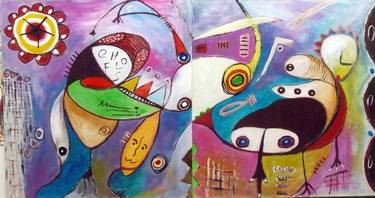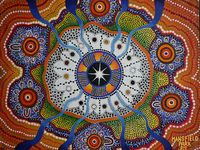Deliberate Imperfection
“Nothing we see or hear is perfect.
But right there in the imperfection is perfect reality.”
~Shunryu Suzuki
Some people are perfectionists, going great lengths and through punishing routines to achieve the perfect figure, the perfect score, the inimitable performance. But there are cultures around the world that have learned to abandon this rigid and obsessive behavior, and embrace the concept of imperfection. Artists and craftsmen of such cultures would deliberately introduce flaws into their works to remind themselves that flaws are an integral part of being human.
In Navajo culture, rug weavers would leave little imperfections along the borders in the shape of a line called ch’ihónít’i, which is translated into English as “spirit line” or “spirit pathway. The Navajos believe that when weaving a rug, the weaver entwines part of her being into the cloth. The spirit line allows this trapped part of the weaver’s spirit to safely exit the rug.
The Navajos also believe that only God is perfect and that humans cannot achieve the same perfect level. So they make sure to leave little imperfection in anything they create. Usually, one has to look very close to find the imperfection, so it does not detract from the beauty of the item. It might be a loose piece of yarn, or a different colored bead.
That God is perfect and humans are not is also one of the main principles of Islamic architecture. The beautifully decorated vaulted ceilings of many mosques in the Arab world appear symmetric, but often have minor irregularities imperceptible to most visitors.
Even the National Cathedral in Washington, D.C., the capital of the United States, has several small architectural flaws that has been attributed to an apocryphal medieval custom that sought to illustrate that only God can be perfect. The ceiling that arches over the main aisle of the cathedral do not meet at the center, but is slightly off its axis. The choir-stalls along the nave of the church are also not aligned.
In the Punjab region of India and Pakistan, an embroidery technique called Phulkari, which literally means flower work, is highly popular. Intricate patterns using brightly colored threads are woven into shawls and head scarfs and other garments by women for their own use or for their family.
Most Phulkari patterns are highly regular, but sometimes women introduce small color or pattern changes into their work. Some are added to protect the shawl’s wearer from the evil eye. Others are stitched to mark important events that occurred during a textile’s creation, such as the joy of a baby’s birth or grief over a relative’s death.
In Japan, incorporating deliberate imperfections is a necessary ingredient of art. This aesthetic concept is known as “Wabi sabi” and has been practiced since at least the 16th century. Characteristics of the wabi-sabi aesthetic include asymmetry, roughness, and simplicity, and appreciation of the ingenuous integrity of natural objects and processes.
The wabi sabi concept is also seen in the robes worn by Buddhist monks. Known as “kesa”, these robes draped diagonally across the body feature a small patchwork construction as a reminder of the humble patched garment worn by the Buddha.
These concepts, aside from paying homage to God, reinforce the idea that there is beauty in imperfections, and beauty itself is imperfect, impermanent, and incomplete.
Sources:
- Radical Self Care Project Overview by shirleytwofeathers - No Comment
- Radical Self Care Image Gallery by shirleytwofeathers - No Comment
- It’s A Wrap by shirleytwofeathers - 3 Comments
- Something To Consider by shirleytwofeathers - 1 Comment
- Nurturing Your Precious Self by shirleytwofeathers - 3 Comments
me: Make Your Own Violet Fire
Abdulrahman: Money Chant – Very Fast
Shirley Twofeathers: It’s A Wrap
Daniel Knirs: It’s A Wrap
Shirley Twofeathers: It’s A Wrap







Leave a Reply